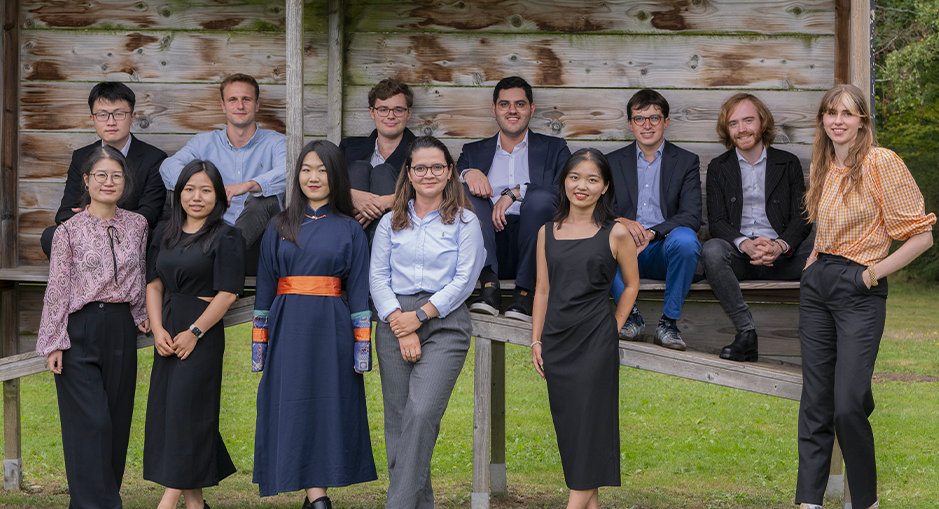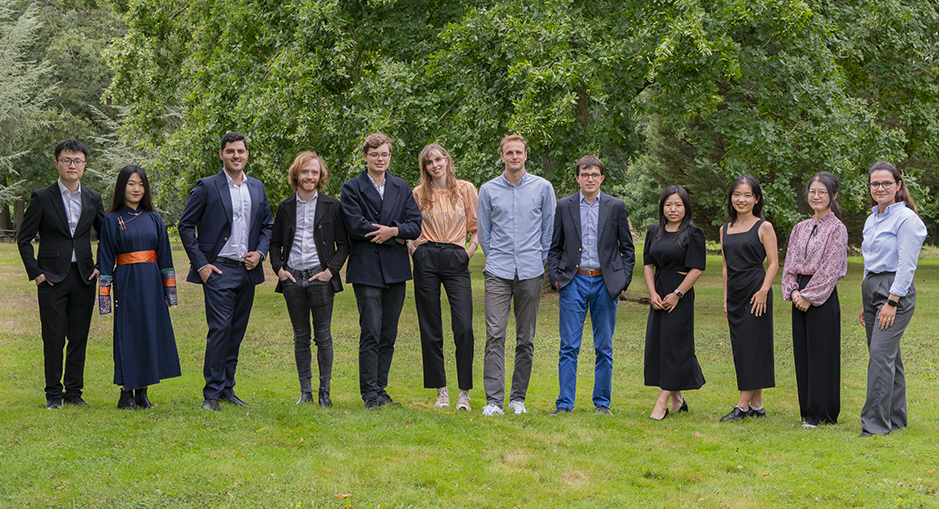HEC Paris Welcomes 12 PhD Students: Navigating New Challenges in a Competitive Landscape
HEC Paris has welcomed a new cohort of 12 PhD candidates, underscoring the institution's continued dedication to fostering academic research. Hailing from diverse disciplines, these scholars from China, Iran, Germany, France, and Turkey bring an impressive range of expertise and research interests to the program. Their arrival coincides with HEC's broader vision of interdisciplinary research, a growing necessity in today’s complex academic environment.

The PhD program at HEC Paris remains integral to the institution's knowledge production. Thanks to significant donor contributions from - among other bodies - HEC Foundation, all PhD students benefit from scholarships, ensuring financial stability as they embark on their academic journeys. This new student cohort embodies the school’s ambition to push the frontiers of knowledge across multiple fields, including finance, economics, technology, and organizational behavior. The 12 benefactors enjoyed a Welcome Week in early September under the guidance of Johan Hombert, the Director of the HEC PhD program.
Reflecting on the challenges faced by today’s PhD candidates, Dean of Faculty Andrea Masini emphasized the increasingly competitive nature of the academic world. "The pros far outweigh the cons," he said during the reception which closed the week, adding, "It's an incredible career. It's a luxury these days to wake up and work on something you are passionate about." However, Masini acknowledged that the academic world "is becoming tougher" with an expanding research landscape. He noted that, as methodologies grow more complex, the training at institutions like HEC Paris must be ever more rigorous to ensure students can thrive in this environment.
The Increasing Importance of Interdisciplinary Research
HEC Paris Dean Eloïc Peyrache echoed Masini's sentiments. Reflecting on his own experience as a PhD student in Toulouse, he emphasized how much the landscape has evolved in the intervening 21 years. “The level of interdisciplinarity today is much higher. Many challenges ahead, like sustainability and artificial intelligence, are interdisciplinary. If I had to do it again, I would connect more with these broader, real-world challenges.”
Indeed, this new cohort embodies that interdisciplinarity. Many students have crossed academic boundaries in their studies and work experiences, reflecting a growing trend within HEC to address complex global issues through collaborative research.
Emile Rogier, for example, blends his background in AI and financial performance with a critical lens on gender biases in accounting. His prior work at ENS Paris-Saclay and his hands-on experience in fintech offer him a unique perspective on how artificial intelligence intersects with corporate finance. Rogier's PhD at HEC will likely further explore how technology can reshape financial markets, a subject of great importance as businesses increasingly rely on data-driven decision-making.
Similarly, Wen (Natalie) Wen, from China, merges her studies in sociology and economics to focus on ESG strategies and their impact on entrepreneurial firms’ IPO outcomes. She brings with her a wealth of experience from Beijing University and Hong Kong University of Science and Technology, where her work examined the relationship between social networks and business ties in China. Wen’s research aims to bridge gaps between corporate social responsibility (CSR) and public market performance, a topic that is becoming more relevant as businesses face greater pressure to demonstrate their social and environmental credentials.
Technology, Data, and New Research Frontiers
The emphasis on technological expertise is clear in this new group, particularly with students like Ziqing Li, whose research spans data-driven machine learning algorithms and action detection. With degrees from Tsinghua University and Université Paris Cité, Li is already tackling complex issues such as health indicator prediction using transfer learning. Her background in both technology and economics positions her to make significant strides in how AI can support decision-making processes in various industries, including healthcare.
PhD candidates are increasingly reliant on advanced computational tools, a point underscored by Masini. "The importance of computational power has evolved significantly," he said, noting that students working in empirical fields, such as economics or finance, now require robust infrastructure to handle large datasets. This technological shift is a key factor in the rigor of HEC’s PhD training. Masini also emphasized the importance of strong mentoring relationships, stating, “The proximity with advisors and other professors has become even more important to guide students through these complex challenges.”
Global Experience Shaping Research Perspectives
The international composition of the cohort adds further depth to HEC’s research community. Armin Hajibeygi, from Iran, brings a strong background in system engineering and digital transformation, having co-founded a tech startup focused on algorithmic trading. His research at HEC will likely explore the interface between technological innovations and healthcare operations, drawing on his extensive experience in both industries. Hajibeygi’s ability to lead cross-functional teams and integrate machine learning into business strategies reflects the kind of interdisciplinary approach that Dean Peyrache highlighted as crucial for tackling global challenges.
From Turkey, Ayse Aylin Kaya also embodies this intersection of academia and industry. Having worked as a senior product manager at Amazon, where she oversaw a multi-billion-dollar category, Kaya’s PhD research will focus on consumer behavior, cognitive biases, and pricing strategies. Her academic grounding in industrial engineering, coupled with her extensive practical experience in strategy and marketing, will likely contribute fresh insights into how businesses can adapt to evolving consumer expectations.
Arthur Bert, a French national with dual Masters degrees from ENS-PSL and HEC Paris, is another example of a student pushing boundaries in behavioral economics and organizational strategy. His research on the effects of mental load and emotional fatigue on worker productivity is particularly timely, given the ongoing debates surrounding workplace mental health and burnout. Bert’s work will likely have practical applications for improving corporate structures, something he is deeply passionate about.
Amongst the dozen PhD students arriving on the Jouy campus was its most precocious member, Haila Amin. She has had a remarkably rich academic career already, inlcuding a Master of Law from London's BPP Law School, a Bachelor of Arts in philosophy from Columbia University and another BA from Sciences Po Paris. Her research interests have already allowed her to explore form function dichotomy in marriage law and the cross-industry application of the circular economy model. These approaches will be enhanced by her linguistic dexterity, ranging from her native Mongolian to her apprenticship of English, French and Mandarin.
Cultivating a Supportive Research Environment
Despite the personal and intellectual challenges that come with pursuing a PhD, both Peyrache and Masini stress the importance of collaboration and support. While PhD students often face solitary work, HEC Paris aims to cultivate a vibrant research environment where interaction with peers and faculty is encouraged. “The more you interact with others, the more successful you will be,” said Masini. This sentiment reflects the institution's broader emphasis on building a collaborative research community both within the doctoral community of over 60 scholars, and with HEC's research professors.
Matthias Xaver Huber, from Germany, exemplifies this collaborative spirit. His research assistantships at LMU Munich and ESSEC Business School have focused on sustainability reporting, societal trust, and board diversity. At HEC Paris, Huber aims to explore the intersection of accounting and societal outcomes, addressing key questions about how companies can enhance transparency and governance in an era of increasing stakeholder scrutiny.
A Global Perspective with a Common Goal
The diverse academic and professional backgrounds of these students are matched by their shared passion for pushing the boundaries of knowledge. A case in point is Qiyue Shen. The Chinese scholar is diving into the unintended consequences of environmental regulation on workplace safety, blending insights from corporate finance and environmental economics. Meanwhile, Arthur Poinsard brings his expertise in European business law and financial law, aiming to contribute to ongoing debates around corporate governance and shareholder engagement.
As Dean Peyrache noted, today's PhD students are not confined to narrow academic silos. The challenges they face - whether in sustainability, AI, or organizational behavior - demand a multidisciplinary approach. This cohort of 12 PhD candidates at HEC Paris reflects the school’s commitment to preparing researchers to tackle complex, global challenges. With the support of cutting-edge infrastructure, strong mentorship, and a collaborative environment, these scholars are poised to make significant contributions to their fields and beyond.
